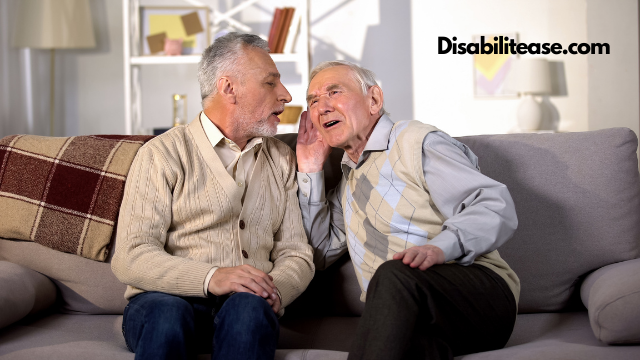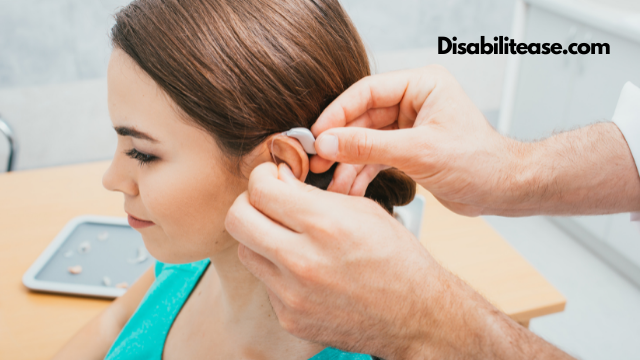Unilateral hearing loss is a type of hearing loss in which your one ear starts losing its ability to hear things while your other ear keeps working fine.

In the US alone, over 0.6 million people have unilateral hearing loss, and this number is way higher if we consider the overall population of the world.
Here is a related article that might interest you on How Come Deaf People Can’t Speak?
If you also think that your one ear is losing its ability to hear, this guide is for you. In this comprehensive DisabilitEase.com guide, I’ll tell you the symptoms of deafness from one ear and the causes behind it. I’ll also cover the possible treatments for deafness in one ear. Let’s get started.
Table of Contents
Hearing Loss In One Ear
Hearing loss in one ear is a common issue these days, and thousands of people around the world suffer from it. If you develop this condition, you won’t be able to hear properly from one ear, and you will have only one functional ear to listen to everything, which can make things difficult for you.
In medical terms, this problem is known as unilateral hearing loss, more specifically single-sided deafness, because it only deafens one ear. The good news for you is that unilateral hearing loss is curable in many cases, so I will recommend that you should contact your doctor for complete diagnosis and treatment.
How Do I Know If I’m Deaf In One Ear?
Unilateral deafness is not a hidden problem, and if you have this condition, you can look for the following symptoms, which will allow you to conclude if you have this problem or not.
- Ringing – If you continuously have ringing in your ear, it could be a sign that you have unilateral deafness. The medical term for ringing in the ear is “Tinnitus.”
- Difficult hearing – If you experience difficulty in hearing others and often ask them to repeat themselves, it is another sign that you could have unilateral deafness.
- Favoring non-dominant ear – If you have recently switched to your non-dominant ear for receiving phone calls because you can’t hear them properly in your other ear, it could be another sign of unilateral deafness.
- Fatigue – If you think that you have trouble hearing from one ear and you end up having fatigue at the end of the day, it is another symptom of unilateral deafness.
If you have any of the above symptoms and you are experiencing hearing loss in one ear, you should go to your doctor for a medical exam. They will examine your ears and do some tests which will help them determine if you have unilateral hearing loss or not.
What Causes Hearing Loss From One Ear?
When it comes to hearing loss from one ear, there are possible causes that can cause it. These are some of the major causes of hearing loss from one ear.
- Injury – If you have injured your ear while cleaning it, it can affect your hearing from the injured ear.
- Loud Noises – If your ears are exposed to very loud noises, they can partially affect your ability to hear. If you are exposed for an extended period, they can damage your hearing ability permanently.
- Tumor – If your body has developed a tumor in your ear, it can also block your ear from receiving outside sound and cause unilateral hearing loss.
- Medical condition – Similarly, there are many medical conditions such as acoustic neuroma, eardrum rupture, otitis externa, shingles, Reye’s syndrome, and temporal arteritis that also cause unilateral hearing loss.
- Medicines – There are also various drugs such as chemotherapy drugs, certain antibiotics, salicylate toxicity, and diuretics that can also cause temporary hearing loss from one side.
Why It’s Important To Treat Your Unilateral Hearing Loss?

Our ears play an important role in our lives, and they collect valuable data along with sound, which helps the brain with our balance. However, if you develop unilateral hearing loss, your brain will get input from only one ear, and you can experience some issues in balancing and movement.
How Is Hearing Loss In One Ear Treated Or Managed?
When it comes to the treatment of hearing loss in one ear, there are various methods that are used by doctors. These are some of the major options which your doctor can consider for the treatment or management of deafness from one ear or unilateral hearing loss.
- If your one-ear hearing loss is temporary and it’s due to wax or any object which is blocking your ear canal, your doctors can take out the object, and your hearing will be fixed.
- If you are experiencing hearing loss due to a medical condition such as an infection in your ear, doctors can also use medication to fix it.
- If your hearing loss is permanent, you can use a hearing aid that will allow you to hear sound from the environment. These devices basically amplify the sound your ear receive, which makes it easier for your ears to listen. This solution works for people with mild to moderate hearing loss.
- Contralateral routing of signal (CROS) device is another solution that can be used for people with unilateral hearing loss. In this solution, a microphone is placed outside the ear which is experiencing hearing loss, and it simply sends the voices it records to your functional ear.
- Bone conduction is another very useful solution that can be used for people with hearing loss from one ear. In this process, a sound processor is placed outside the ear with hearing loss, and when it receives any sound, it sends it to your functional ear using bone conduction.
- Cochlear implant is a solution that involves a surgical procedure, and doctors will implant a device that comes with an external processor and a device on the inside. These devices will work to process sounds and stimulate your hearing nerve. This procedure is only prescribed for people who have severe hearing loss, and this procedure comes with its own risks.
Frequently Asked Questions [ FAQs ]
Is Deafness In One Ear Permanent?
It mainly depends on the thing which is causing hearing loss in one ear. If it’s due to a medical condition such as an infection, it shouldn’t be permanent, and you can get your hearing back with the help of medication. However, If it’s due to permanent reasons such as genetics, you will need to use solutions such as a hearing aid to getting your hearing back.
What To Do If You Lose Hearing In One Ear?
The first thing you should do is not to try anything on your own and should contact your doctor as soon as possible. Once your doctor examines your ear, they will tell you the possible treatments which can fix your ear.
Can I Treat Unilateral Hearing Loss At Home?
Unilateral hearing loss can be pretty complex, and if you try to treat it at home, it can get worse, and you can lose your hearing permanently. So, if you are experiencing hearing loss from one ear (unilateral hearing loss), contact your doctor for treatment.
Can COVID-19 Cause Hearing Loss?
COVID-19 virus is pretty versatile, and its symptoms are evolving with each new variant. However, doctors have observed that COVID-19 can cause inflation in the Eustachian tube, which is the tube that connects your middle ear and nose. As a result of inflation in the Eustachian tube, your middle ear can experience congestion which can lead to temporary hearing loss.
Conclusion
In this guide, I shared the symptoms which you can use to determine if you are deaf in one ear or not. I also explained the common causes behind hearing loss in one ear and shared the treatments and management solutions that can be used to fix it.
I hope you found this guide useful and if you have any questions, please let me know in the comments. Also, don’t forget to check this guide if you want to learn how deaf Edison was.

Hi, my name is Eddie, I am a professional trainer specializing in the elderly population and I’m also a website designer. I love training in the gym, going to the beach, traveling, and having good food.
I combined my love for sport and website designing to make “DisabilitEase” whose purpose is to help elderly and disabled people live a more full and active life, have more fun, and enjoy their unique journey despite any disability.



